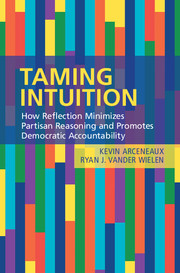Book contents
- Frontmatter
- Contents
- List of Figures
- List of Tables
- Preface and Acknowledgments
- 1 Democratic Accountability and the “Rational” Citizen
- 2 A Theory of Individual Differences in Reflection and the Intuitionist Model of Political Reasoning
- 3 Measuring Individual Differences in Reflection
- 4 Toeing the Line: Partisan Identities and Policy Attitudes
- 5 Throwing the Rascals Out: Partisan Identities and Political Evaluations
- 6 Can't We Disagree without Being Disagreeable? The Role of Reflection in a Polarized Polity
- 7 Reflections on the Role of Reflection in Democracies
- Appendix Details of Empirical Studies and Statistical Analyses\
- Notes
- References
- Index
Preface and Acknowledgments
Published online by Cambridge University Press: 30 August 2017
- Frontmatter
- Contents
- List of Figures
- List of Tables
- Preface and Acknowledgments
- 1 Democratic Accountability and the “Rational” Citizen
- 2 A Theory of Individual Differences in Reflection and the Intuitionist Model of Political Reasoning
- 3 Measuring Individual Differences in Reflection
- 4 Toeing the Line: Partisan Identities and Policy Attitudes
- 5 Throwing the Rascals Out: Partisan Identities and Political Evaluations
- 6 Can't We Disagree without Being Disagreeable? The Role of Reflection in a Polarized Polity
- 7 Reflections on the Role of Reflection in Democracies
- Appendix Details of Empirical Studies and Statistical Analyses\
- Notes
- References
- Index
Summary
This project began with a lighthearted discussion over dinner as a simple and relatively narrow idea about whether partisan identities lead people to respond more emotionally to politics. As we talked about it more, we decided that we had the kernel of an idea that could become a research note. With these modest ambitions, we set out to learn more about the psychology of information processing and stepped into the rich literature that lies at the intersection of neuroscience, economics, and psychology. We quickly realized a grander ambition and saw the potential to fuse two theoretical traditions that provide disparate, and often conflictual, foundations for the study of political attitudes and behavior: rational choice and social psychology. Both of these traditions give different conceptions of the role that partisan identities play in shaping political decisions and, more crucially, different conceptions of whether voters are up to the task of self-governance. The rational choice framework presupposes that citizens make decisions in line with their values and hold politicians accountable when they fail to serve as faithful delegates. In contrast, social psychological accounts suggest that citizens are incapable of getting beyond their partisan biases and hold politicians from the opposing party to a far different standard than they do politicians from their own party.
Of course, we are not the first to tackle the ambitious task of merging rational choice and social psychological approaches to study political phenomena. We are indebted to scholars, such as Cheryl Boudreau, Dennis Chong, Eric Dickson, Skip Lupia, Mathew McCubbins, Rose McDermott, Becky Morton, and Jon Woon, who have blazed the path before us, showing the way. To the extent we offer something useful, it is because we were fortunate to build on the foundation that they created. We see our contribution as better incorporating psychological motivations into the model of how people arrive at political decisions, and in doing so, introducing a different way to think about rationality in political science. This project also builds on our previous separate streams of research. Arceneaux's previous work invokes a more rudimentary version of the Intuitionist Model of Political Reasoning than we present in this book, and his work with Martin Johnson starts with the idea that individual differences in psychological motivations have behavioral implications.
- Type
- Chapter
- Information
- Taming IntuitionHow Reflection Minimizes Partisan Reasoning and Promotes Democratic Accountability, pp. xiii - xviPublisher: Cambridge University PressPrint publication year: 2017

